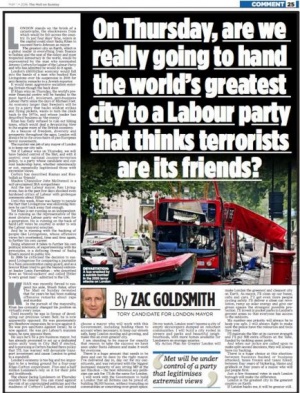2016 London mayoral election
 | |
| Date | 2016/05/05 |
|---|---|
| Type | election |
| Description | The "big first test" for Jeremy Corbyn's leadership of the Labour Party |
The 2016 London mayoral election was held on 5 May 2016 and Sadiq Khan was elected to succeed Boris Johnson as Mayor of London. Twelve candidates contested the election:
- Siân Berry, Green Party
- David Furness, British National Party
- George Galloway, Respect Party
- Paul Golding, Britain First
- Zac Goldsmith, Conservative Party, MP for Richmond Park
- Lee Harris, CISTA
- Sadiq Khan, Labour Party, MP for Tooting
- Ankit Love, One Love
- Caroline Pidgeon, Liberal Democrats
- Sophie Walker, Women's Equality Party
- Peter Whittle, UK Independence Party
- John (Janek) Zylinski, Independent
While many Blairites joined the commercially-controlled media in talking up the London mayoral, Scottish, Welsh and English local elections in May as the "big first test" for Jeremy Corbyn's leadership of the Labour Party,[1] an early January 2016 poll gave Sadiq Khan a 10-point lead over Zac Goldsmith,[2] with bookmakers and pundits all favouring a Khan victory.[3]
In a desperate attempt to avoid defeat, Zac Goldsmith wrote in the Mail on Sunday:
- “Are we really going to hand the world’s greatest city to a Labour Party that thinks terrorists are its friends?”[4]
To which, Sadiq Khan tweeted in response:
- @ZacGoldsmith's campaign is getting more desperate and divisive by the day.[5]
Sadiq Khan was sworn in as Mayor of London on 7 May 2016.[6]
Related Document
| Title | Type | Publication date | Author(s) | Description |
|---|---|---|---|---|
| Document:Why Isn’t Everyone In Favour of Taxing Financial Speculation? | report | 19 April 2016 | Robert Reich | Bernie Sanders wants to tax stock trades at a rate of 0.5 percent (a trade of $1,000 would cost $5), and bond trades at 0.1 percent. The tax would reduce incentives for high-speed trading, insider deal-making, and short-term financial betting. Sanders’ 0.5 percent tax could thereby finance public investments that enlarge the economic pie rather than merely rearrange its slices – like tuition-free public education. |
Many thanks to our Patrons who cover ~2/3 of our hosting bill. Please join them if you can.
References
- ↑ "Tessa Jowell questions chances of a Corbyn government"
- ↑ "Sadiq Khan Winning Race To Be London Mayor: Poll". LBC. Retrieved 12 January 2016.Page Module:Citation/CS1/styles.css must have content model "Sanitized CSS" for TemplateStyles (current model is "Scribunto").
- ↑ Hill, Dave (10 January 2016). "London mayor race: can Zac Goldsmith catch Sadiq Khan?". The Guardian. Retrieved 12 January 2016.Page Module:Citation/CS1/styles.css must have content model "Sanitized CSS" for TemplateStyles (current model is "Scribunto").
- ↑ "Zac Goldsmith criticised by former Tory minister Baroness Warsi over Sadiq Khan 7/7 London terror bus image"
- ↑ "Zac Goldsmith's campaign is getting more desperate and divisive by the day"
- ↑ "Elections: Labour's Sadiq Khan elected London mayor"